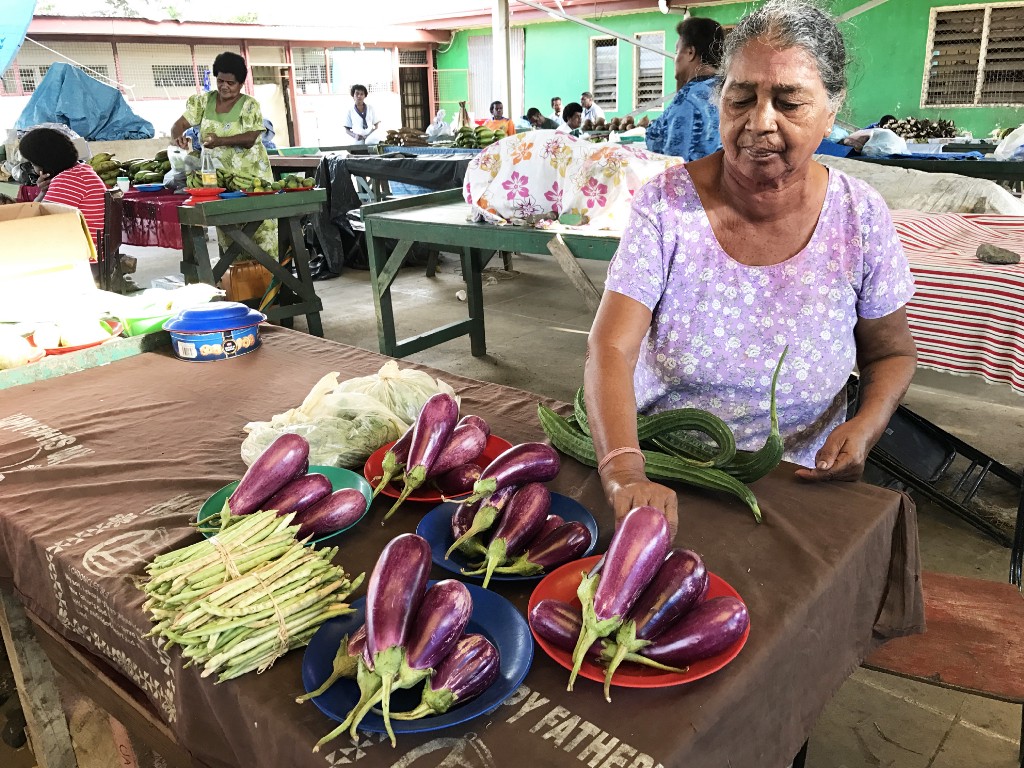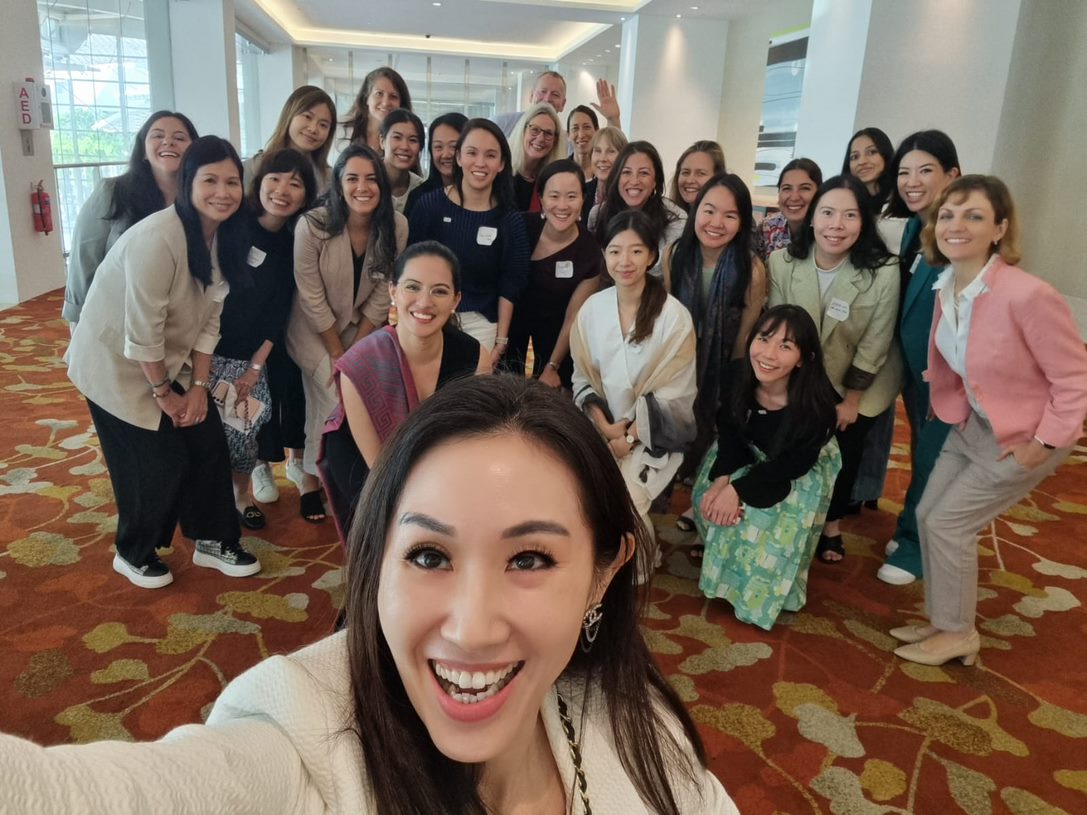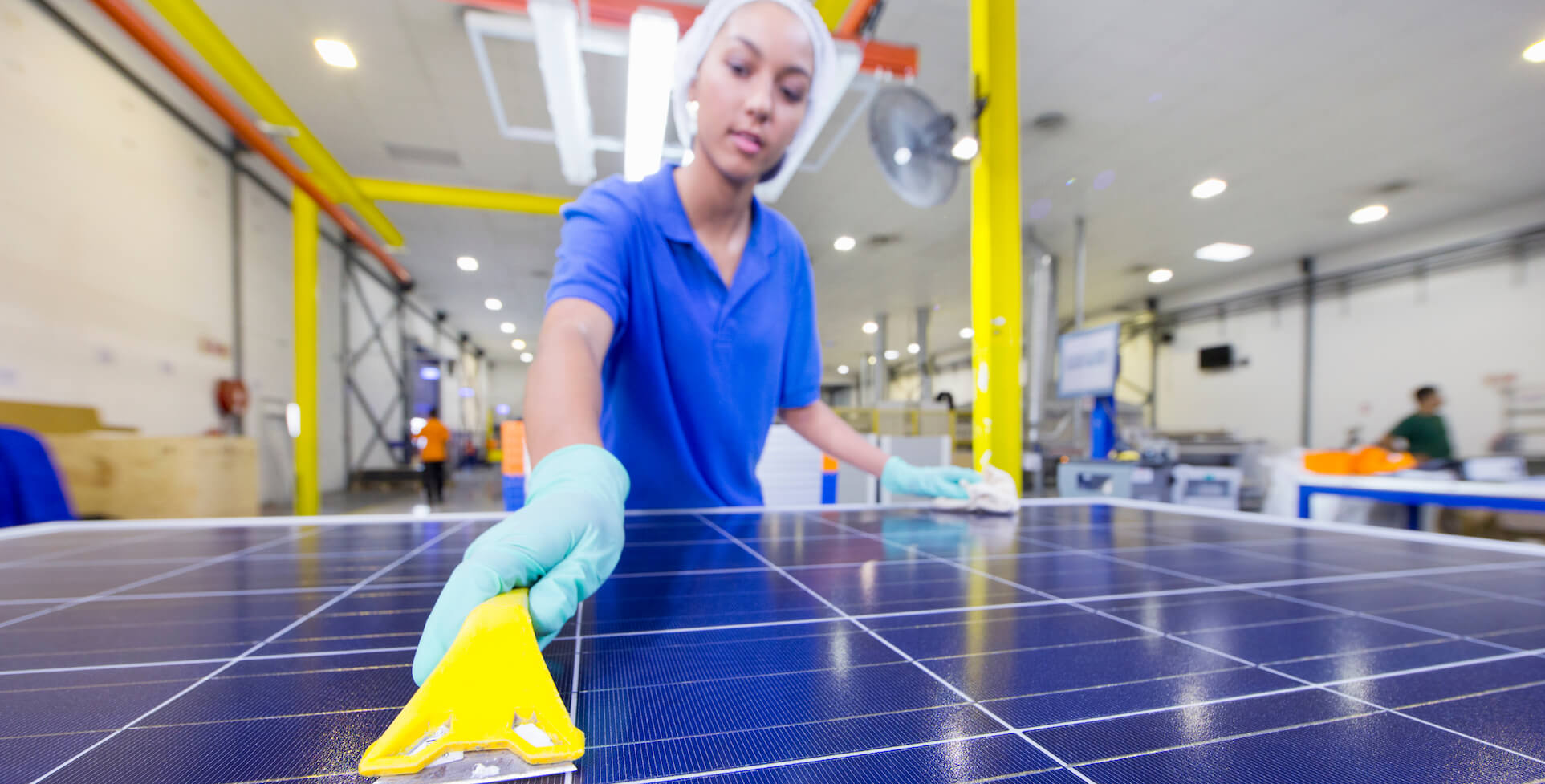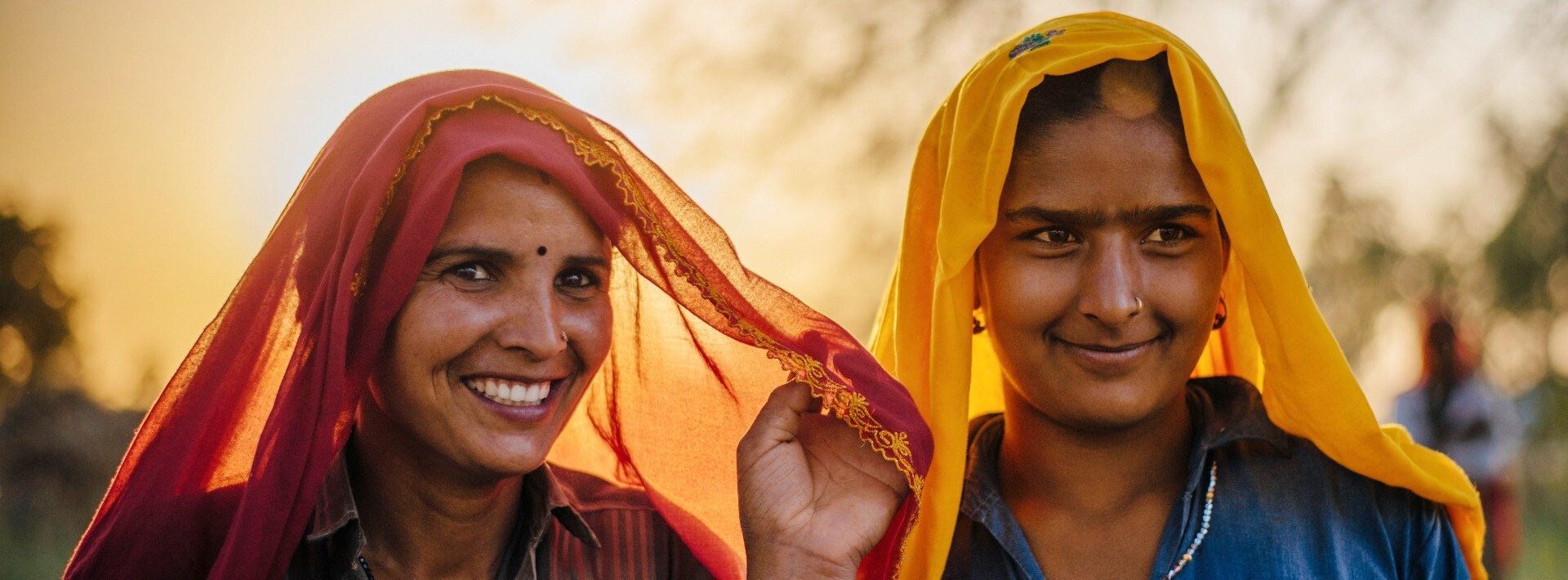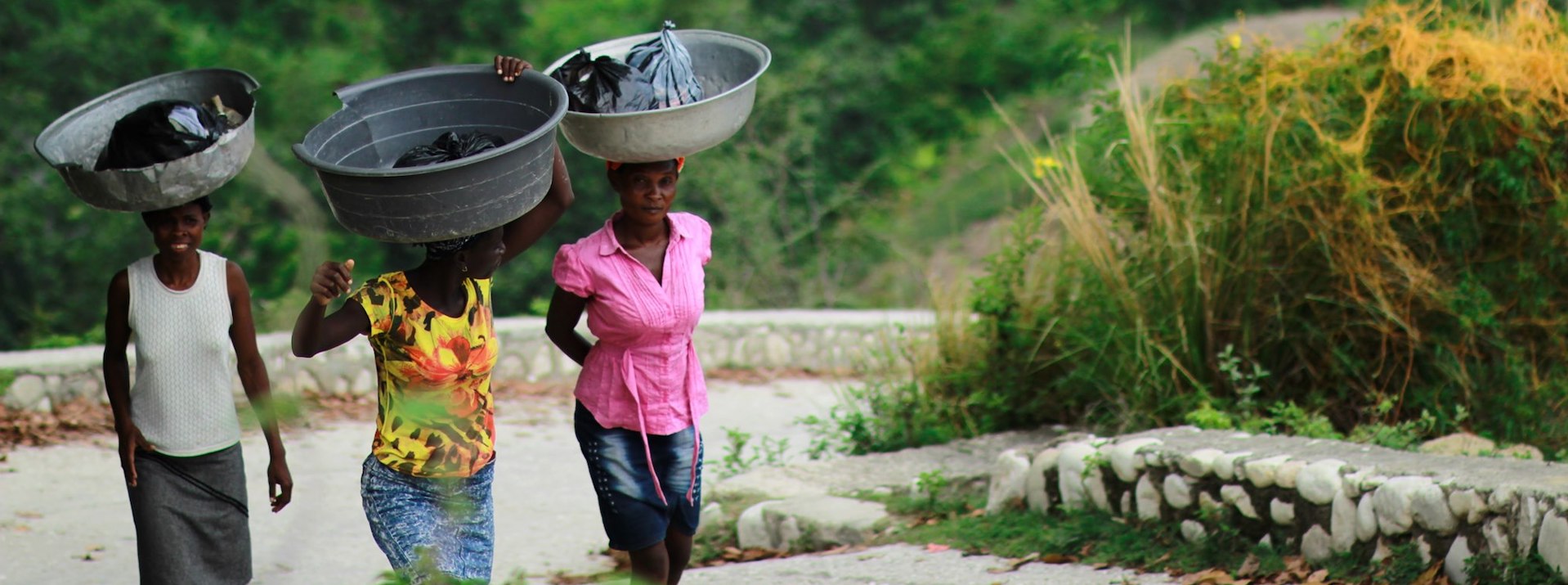TAVUA, FIJI — Adi Alesi Nacoba’s bright purple eggplants, red chilies, and green vegetables bring a splash of color to the bustling market in the warehouse-like space along the northern coast of Fiji’s main island. As she does every day, Nacoba carefully arranges her market booth after a morning of planting and harvesting.
The bounty of her produce is something of a wonder, given that last year her home and farm were wiped out by the strongest cyclone in the recorded history of the southern hemisphere. Cyclone Winston’s 200-mph gusts blew the roof off Nacoba’s home, and wiped out crops in the ground for months. The cyclone destroyed more than 30,000 homes and displaced more than 150,000 people.
“Everything I planted, it was all gone,” Nacoba says. “My farm was all gone.”
Nacoba became a full-time farmer four years ago after serving on the local police force. She wanted to be her own boss, set her own hours and earn money every day, rather than waiting every two weeks to get her wages on the police force.
Now, in her late 40s and recently separated from her husband, she spent six months getting her farm back in shape. She didn’t just rebuild, however. She adapted and redesigned, building new climate-resiliency into both her small farm and her life.

“I have to stand on my own two feet, I have to plant,” Nacoba says. As the sole breadwinner, she says, “I manage to do everything. I’m like a man and a woman in the house, as the head of the family.”
Fiji’s official delegation has decamped to Bonn, Germany to lead the global climate talks aimed at stemming the worst consequences of climate change (Suva, Fiji’s capital, is unable to accommodate the demands of a major global conference). Ten thousand miles away, in Fiji, women are on the front lines of the changes that already are here. As first-responders, their adaptations are a testbed for communities worldwide that face the dislocations and disruptions of rising water, warming oceans, fragile food supplies and epic natural disasters.
A bluffer’s guide to the Bonn — or is it Fiji? — climate talks
Around Fiji, an ecosystem of experiments is showing promising, if fragile, results. In Tavua, Nacoba was able to get back on her feet with support from the “Markets for Change initiative,” a project of UN Women and supported by the United Nations Development Program (UNDP). The aim is to train women in climate-smart farming techniques.
An hour south, in the highlands of Tuvu, an innovative, Fijian NGO called FRIEND (the Foundation for Rural Integrated Enterprises & Development) is generating demand for farmers’ produce and poultry by creating a farm-to-table supply chain.
And through the Women’s Weather Watch on a women’s radio station run by Femlink Pacific, networks of women around Fiji forward text alerts to keep communities informed about storms, rainfall and flooding, and carry their local reports back to the capital.

As host of COP23, as the global climate talks in Bonn are known (the 2015 Paris conference where the climate agreement was reached was COP21), Fiji is highlighting the plight of island nations around the world. Since Vunidogoloa, a coastal village, in 2012 became the first Fijian village to be resettled, the government has identified more than 40 coastal villages that will need to be relocated.
“We are all in the same canoe,” as Fiji’s Prime Minister Frank Bainimarama says.
Markets for Change is training women farmers to use “a diversity of cropping so that if there is a flood, they’ll have some produce that that won’t get washed away, or they’ll have some produce that’s drought resistant,” says Bernklau of UN Women. The initiative is supported by the United Nations Development Program (UNDP).
Women farmers are learning to plant crops that can withstand extreme weather and how to manage finances, so they can have a safety net in times of disaster. Also on the syllabus: better irrigation methods, mulching and soil preparation techniques, and spacing out when seeds are planted, so they don’t lose a large amount of crops in extreme weather.
“I learned how to do the planting, where to get the seeds, and how long it takes to plant a particular kind of produce that we still can plant,” Nacoba says of the workshop run by Markets for Change. Now, she says she’s re-planting two acres of cassava, fruit trees, mango, eggplant, chilies. “I’m trying to plow the rest of the land so I can start with planting long bean and taro.”
Record-keeping and saving money is a big part of the training. “Before, I never kept track of which produce I planted, the time that I started, the money that I earned, and money that I lost,” she says.
“Everybody recognizes that disaster is a fact of life for us. It’s very much in our face, and we can’t turn around,” says Sashi Kiran, founder of FRIEND, the Foundation for Rural Integrated Enterprises & Development, a Fijian NGO. “Women have had such a huge burden of making sure the family is together, the children are looked after, their food needs are met. And, when they have to worry about planting and economic needs as well, the pressure is really high.”
Even if they’re able to re-grow their plants, they may not have the ability to sell their produce. To support women in climate-resilient agriculture, FRIEND is building a market for traditional crops — marketed as healthy, organic and local. “It’s a farm-to-table concept,” Kiran says.

FRIEND buys produce and poultry directly from farmers they’ve been supporting in disaster recovery efforts. FRIEND even opened a new organic restaurant at their headquarters this fall, and most of the ingredients — including vegetables, fruits, spices, and poultry — are sourced from cyclone-affected farmers.

“Now they are building back stronger, and they have the money to do that,” says Dr. Jone Hawea, FRIEND’s associate director. “They are getting prepared come the next cyclone season.”
“Women’s Weather Watch was telling us you have to be prepared, stock everything inside your house, do everything you can do to be safe,” remembers Unaisi Bakewa, a mother of seven who sells vegetables at the Tavua market.
“Sometimes, the weather down here is good, and we don’t know a flood is coming because it’s raining up in the hills. Through the Weather Watch, we will know, ‘Hey, there’s a flood coming.’ We have to alert our members what’s going on, so they can be rescued to an evacuation center.”

As extreme weather becomes the new norm in Fiji, communication in rural areas is key, especially before disaster strikes. “You would think that for a small Pacific island country, information would be easily flowing, but it’s not,” says FemLink Pacific director Sharon Bhagwan Rolls. FemLink runs FemTalk89FM a radio station that bridges the gap between Fiji’s capital city and rural women.
“This is radio, for, by, and about women,” says local FemLink organizer Fane Lomani. “It travels across Fiji, documenting and giving space to women to talk on the radio.”
FemLink’s Women’s Weather Watch keeps women informed about upcoming storms, rainfall and flooding with real-time weather information from Fiji’s Meteorological Office. The system sends text message alerts to rural women across Fiji. The women then text these weather warnings to all the households in their village.
And women in rural areas text back with local weather conditions to FemLink’s staff, situated in Suva, who can amplify what they are saying. “Rural women are able to report what they’re seeing, so people in the capital city are better aware of the reality on the ground,” Bhagwan Rolls says.
Bakewa joined the network two years ago. “I’m a leader, and leaders have to stand up for their community,” she says. “We really have to alert women what’s going on in our area.”
Sonia Narang reported in Fiji with support from the International Women’s Media Foundation (IWMF).

